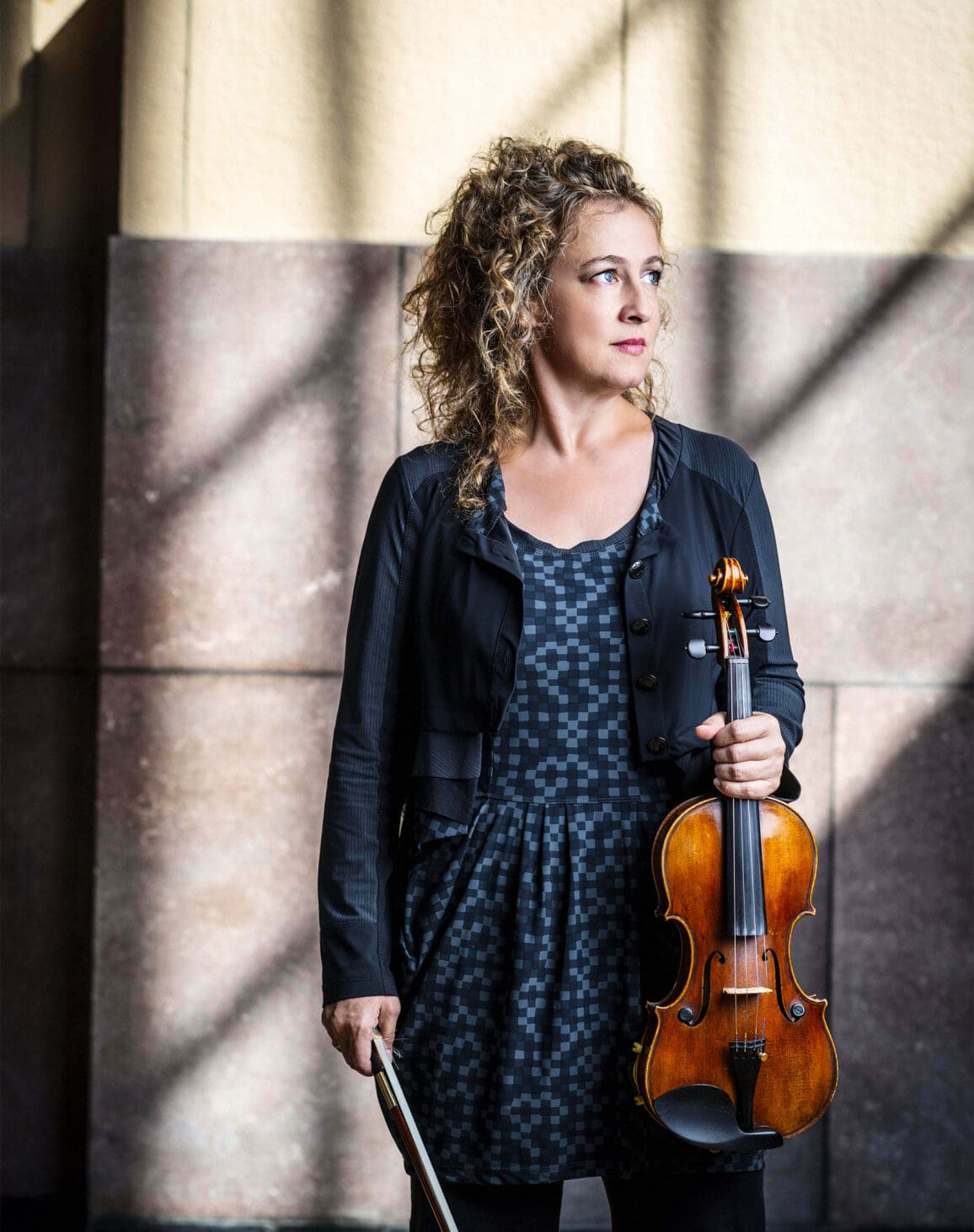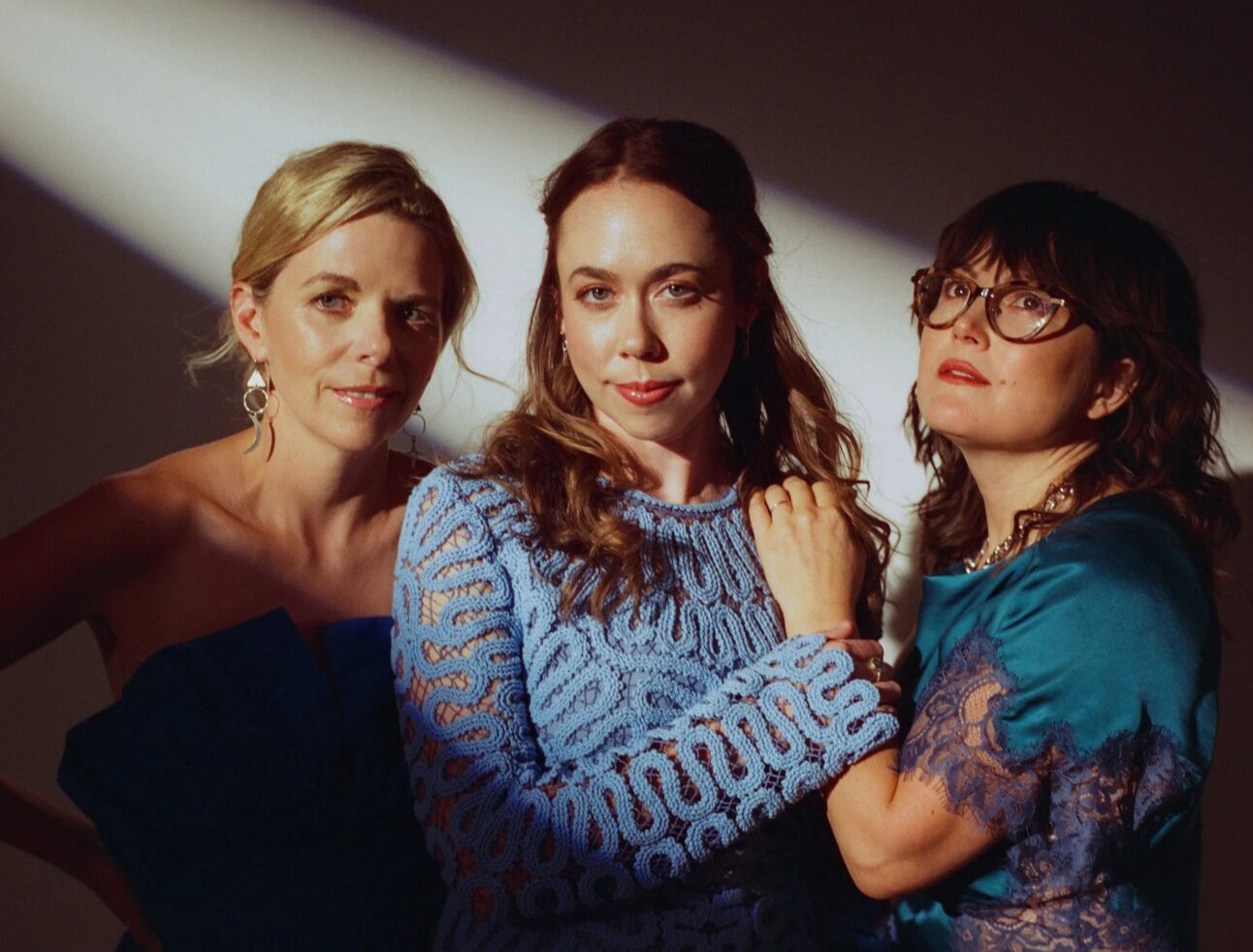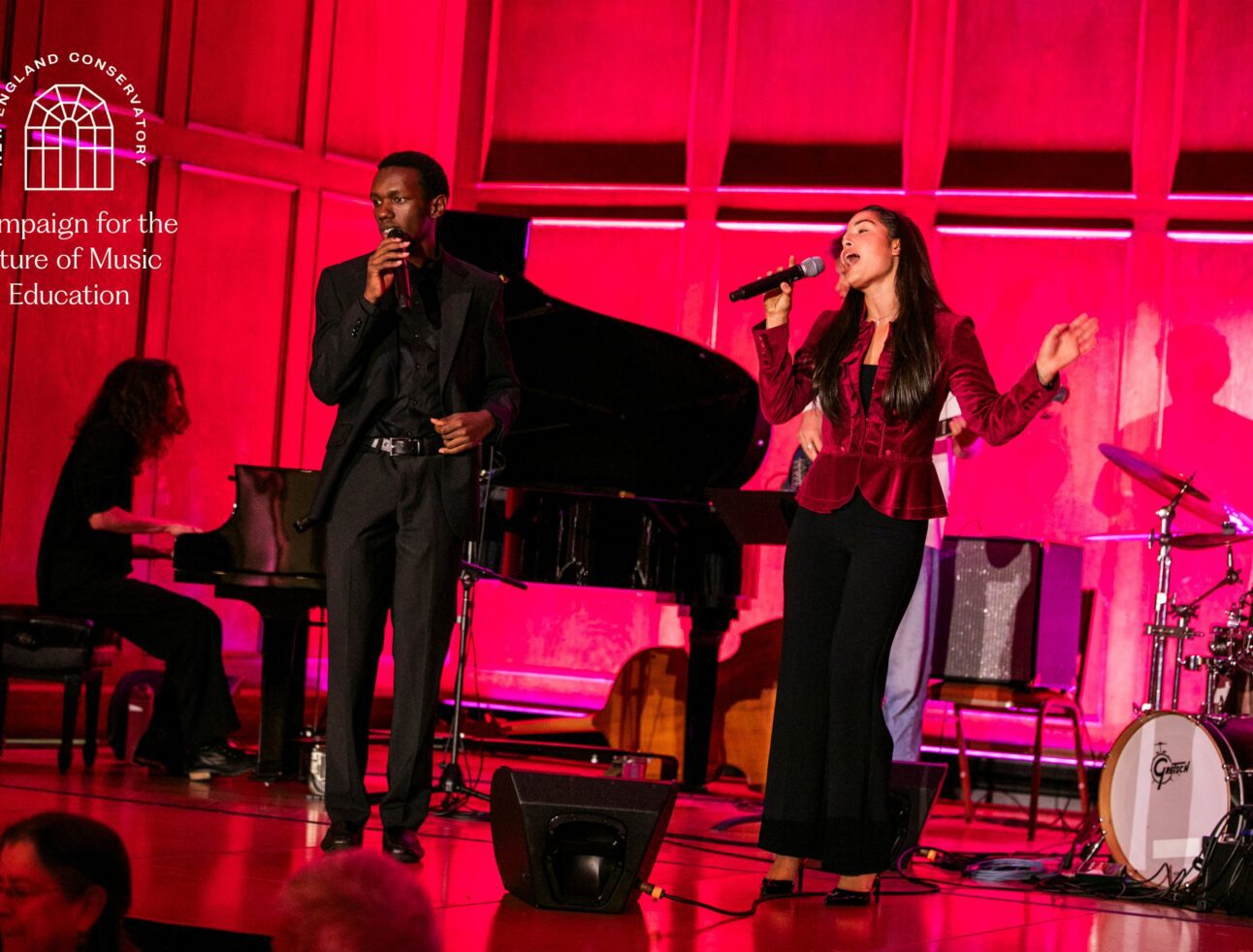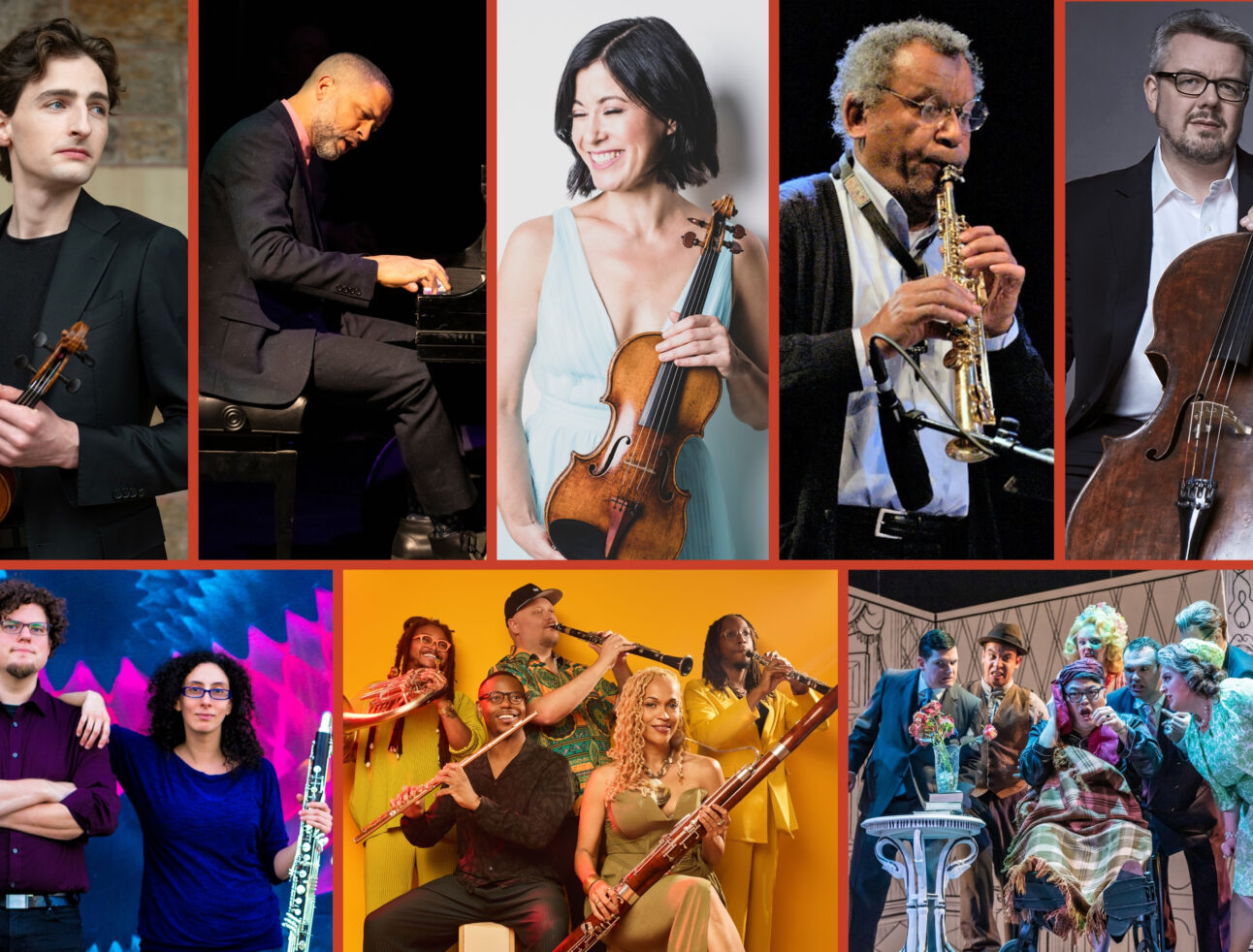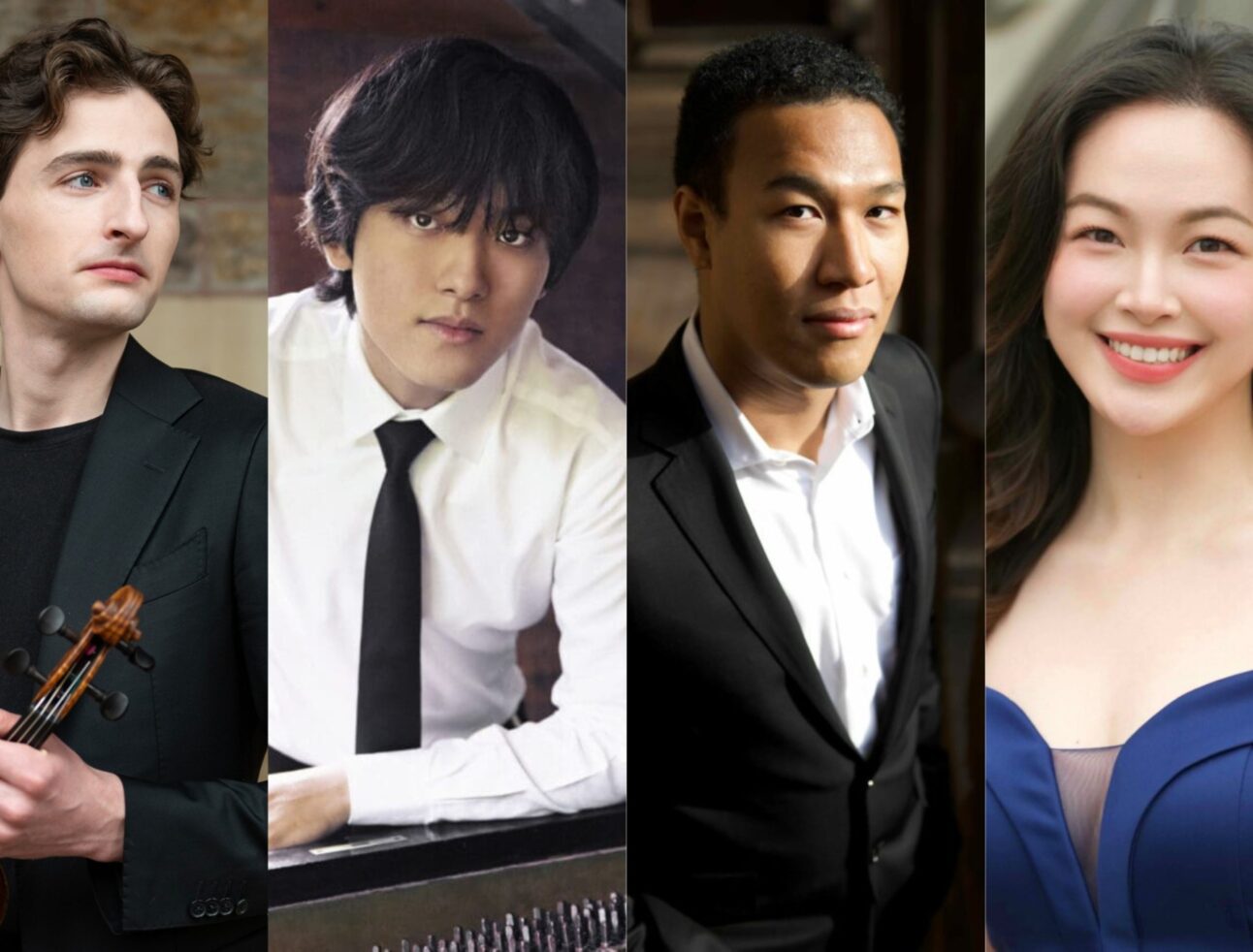Characterizing the multi-faceted career of renowned Irish musician and NEC Contemporary Musical Arts faculty member Liz Knowles in a single word or phrase would be impossible. Depending on the day — or the hour — she is a sought-after performer, composer, recording artist, beloved teacher, podcaster, and author. With foundations as a classical musician, she discovered a resounding love of Irish music as a college student, exploring the music scene of New York City in the ’80s. In her quest to connect these two worlds, Knowles encountered a concept that would show up repeatedly throughout her life: the “in-between,” a theme she says “illuminates the challenge and vitality of the liminal places in life and music.”
To list just a handful of the myriad credits to her name, Knowles was the soloist on the soundtrack for “Michael Collins,” fiddler with “Riverdance,” Broadway’s “The Pirate Queen,” and “The Green Bird,” soloist with the New York Pops, and featured artist for the Ireland 100 Festival at the Kennedy Center. She was the music director and producer for several stage shows and recording projects that toured Europe, Asia, and South America. Her compositions and arrangements have been recorded by John Whelan, Flook, Chicago’s Metropolis Symphony Orchestra, Liz Carroll, Beolach, Bachue, J.P. Cormier, Michael Black, John Doyle, and Ensemble Galilei.
Knowles also leads NEC’s Irish Music Ensemble, a student ensemble within the Contemporary Musical Arts department exploring Irish instrumental musical traditions. Knowles and the Irish Music Ensemble are the stars of the newest installment of the conservatory’s performance series NEC Studio Sessions, out Friday, March 15. Ahead of the episode’s release, Knowles shared details on her career’s diverse trajectory, her philosophy as a music educator, how she balances an abundance of creative projects, her best advice for young musicians, and more.
New England Conservatory: What did your journey into Irish music look like?
I first learned classical music, starting on the piano and then Suzuki violin at six or seven. I did that through high school and decided to go to college for music. I went to SUNY Stony Brook on Long Island, and it was there that everything just exploded. Being on Long Island and so close to New York City, one of the advantages was I was doing lots of gigs and being exposed to so many kinds of music. I was also playing everything from early music to contemporary music, and it really just exploded everything on the violin for me.
One of the things I kind of accidentally ran into was Irish music. I had never heard the fiddle make those sounds. I grew up in Kentucky — in the Bluegrass, in fact — and though I loved country and bluegrass music, it never drew me to playing it. I heard a couple of New York Irish fiddlers at a small festival on Long Island, and it was instant. It was really “love at first hear,” like my DNA lit up, and I knew I had finally found the musical language that made sense to me, melodically, in form, texture, and tone. Ironically, my grandmother found some handwritten music that she notated when I was very young. It was a piece I made up on the piano because I couldn’t read music. I played it years later, and it was modal and moved in ways that were so close to Irish music.
The great thing about New York was that Irish music was everywhere. I was lucky that the commercial success of Irish music at that time — this was in the late ’80s — was exploding. Riverdance started, and I ended up doing Riverdance within a few years of starting to play Irish music, and then my career went from there. I didn’t set out to be a traditional musician, but I found it along the way. It was a hard road to move from classical to Irish, one that I traversed with very little instruction and required creating my own trajectory, but one that was unquestionably the right path for me. Those first years learning this music represent the most valuable, exciting, hardest, and richest in-between of my life!
New England Conservatory: You just mentioned the “in-between,” a concept that’s also referenced in your bio as a recurring theme in your life and career. Can you talk more about what it means to you?
The idea started back when I started doing a lot of touring. I realized that my life was kind of wonderful when I was at home, and it was wonderful when I was on the road, but during those in-between days of getting ready for a tour, there were these little windows of time where I was like, I’m really agitated. I’m not settled, I’m not focused, I’m not myself. And I started realizing that there are a lot of musical parallels to that. I came from classical music and went to Irish music. There was a great period in between for me where I was trying to meld these things, trying to separate them and connect them at the same time. And it wasn’t easy, and it didn’t fit into place in a logical way. It just took time. And so this concept keeps coming up over and over again.
I’m a teacher of music, and I see it in students all the time. This gray area that happens between practicing music and being able to perform and hearing music and being able to realize it on an instrument. And compositionally, there is this in-between of trying to find what’s in your head, put it into your hands, and then put it into a piece of music. So, it is quite an overarching theme that keeps coming up in multiple ways in my life, and I love it when it does because it’s such a great reminder that it’s not always the goal. It’s not just the awards; it’s not just the gigs. It’s not just the finite things we hold up as being the most important. It’s the transition to getting there. And that’s so important in music, but it’s so important in life, too.
New England Conservatory: What have you been working on lately?
I feel because of the pandemic — and I think a lot of musicians can relate to this — one of the things I’ve been able to do is spread out what I’m doing a little bit more. I think four years ago, I would have said I’m primarily a performer who does some teaching and a bit of writing. And now, because of the in-between, I’m writing a newsletter every two weeks, and I’m hoping to turn that into a book in the coming year. I also started podcasting. I do one with another Irish fiddle player, Liz Carroll. We’ve just finished our first season and are about to start our second, and I’ve really enjoyed that work. I’m also doing a lot of planning for book projects. I also have a number of albums coming out this year. I have a trio with my husband, Kieran O’Hare, and we’ve just finished an album that will be released in the next few weeks. I have another project, a trio with one person from Ireland and one from the Congo, and that should be out by the end of summer. So it’s kind of a year of explosion after four years of nothing. It feels multifaceted and a bit crazy, but I’m very excited that there are so many different things.
New England Conservatory: What has your experience been leading the Irish Music Ensemble at NEC?
Well, I love it, first of all! It’s one of my favorite things to do at NEC. Before this year, I taught the Ensemble only half the year, but this year, we decided to make it last the whole year, so that’s been a really wonderful experience. I’ve had the same group of students for the fall and spring, meaning we can dive into things even more. I think it’s true of all the music taught at NEC, but in particular Irish music, you really need it to distill. We don’t just learn tunes to play them and be done with it. We learn tunes to play them hundreds and hundreds of times, and every time we play them, it’s like a jazz standard — you get something new out of it. The experience is different depending on who you’re playing it with, how you play it and what you’ve decided to delve into. So, I feel like we’ve gotten more of a chance to do that this semester. The students seem really invested in it, and we’ve had a lot of fun. We want to have a very firm foundation in the history of Irish music and where it came from, but there are so many wonderful modern ways of approaching it, and that’s where people’s creativity and personality have come out.
New England Conservatory: How do you balance being performing with teaching, writing, podcasting, and the many other projects you are working on?
It’s a very tricky thing. If there is one thing that I complain about all the time to my husband, who’s also a musician, it’s that I never seem to get the balance right. And if there was one piece of advice I would give students, it’s that you’re never going to figure it out. If somebody has figured it out, I’d love for them to tell me. In a musician’s life, if you’re able to do things like composition, arranging, performing, recording, and teaching, and you want to do all of those things, it’s a really tricky thing to get a life that feels like a manageable balance.
One of the fundamental things is that we don’t often get to choose the schedule that we are on or when the gigs are. Sometimes we do, but a lot of times, we get handed something, and then we have to run with it. We always joke, especially on tour, that it’s “hurry up and wait.” So you have to be good at really being able to jump around things, be a multitasker, and also be able to just kind of lift yourself out of one thing and put yourself into another and do it very quickly. It’s not always comfortable, and it’s not always the schedule you want it to be, but we do everything we can to try to fill in the “in-between” with stuff that matters. But I wouldn’t change anything, even when my life gets completely hectic. I love everything I do, and I have to remember that when I get exceedingly tired.
New England Conservatory: What do you love the most about teaching?
I have been teaching since high school, and I tell all my students that you don’t have to be an advanced player to start teaching. What teaching does is twofold. First, you’re providing a service to somebody, which is the most wonderful thing in the world — to be there for somebody’s trajectory, discovery, and all the hard work they put in. It’s a tremendously intimate relationship to be a teacher to a student. You’re responsible for a lot, but you also get to witness a lot. And it’s one of the most beautiful relationships you can have. If I can help somebody get to where they want to get and feel the way they want to feel and be able to express themselves the way they want to express themselves, then I’ve really done my job.
The other piece is a reflection of ourselves. You learn that over years of teaching, to witness somebody learning, you have to be able to convey that information and convey your own experience, convey the technique, and convey suggestions. It’s kind of like that Canadian sport, curling, where they’re brushing, brushing the ice around this massive puck. They don’t ever really touch it. And that’s how I feel teaching is.
The reflective piece is that when they understand something, I know I understand it better as well. I get to dive into so many things that I’ve already dived into a hundred times and do it again and again and again. It teaches me about my own playing, my own mind, my own learning, my own curiosity. Really, it’s the greatest challenge because you have to stay on top of all that. Teaching is one of the hardest things I do, but also one of the most rewarding.
New England Conservatory: This month, we are celebrating Women’s History Month. In honor of this occasion, what would be your best advice to female-identifying students aspiring to careers as successful musicians?
I’ve always treated myself like I am trying to learn and be the best musician I can be. And when I meet other musicians, I want them to be the best musicians they can be. That’s where I meet people. If I had any advice for female-identifying people, it’s to lead with the music and your personality; the rest of it is not always up to you. I feel this mentality of leading with the music has served me well, because it really is about the music and about the relationships.
Indeed, though I feel I have always tried to lead with music and look at others through their music, I am well aware of the challenges that have existed and still exist in the entertainment industry at large. In my early days of learning about Irish music I became instantly aware that it wasn’t until recently that women were recognized for their playing. There are many cultural and economic reasons why women were not at the forefront of Irish music in a public way. Certainly, by the time I was learning this music, the commercialization of Irish music did much to push women out front, but it also, in many cases, attached a stereotype to them too — the “chick fiddle player” or “Celtic woman singer,” and though these are easy marketing tools, they do not reflect the music itself.
New England Conservatory: What keeps you going?
Liz Knowles: What keeps me going is that I know I can wake up and grab my violin and go into my bathroom (I practice a lot in the bathroom because it just sounds better) and I can find this meditative place. Some days, I’m more on the production; some days, it’s all about teaching. Some days, I don’t get to practice. But generally, every day starts with the fiddle in my hand. And from there, everything grows.
See NEC’s Irish Music Ensemble perform at the CMA Small Ensembles Festival on Sunday, May 5, at 11 a.m. in the Eben Jordan Ensemble Room. Click here for more information.
Listen to Liz Knowles’ podcast with Liz Carroll, The Lizzes, on streaming services, and sign up for her bi-monthly newsletter, LizNotes, here.
“Generally, every day starts with the fiddle in my hand. And from there, everything grows.”
Liz Knowles
